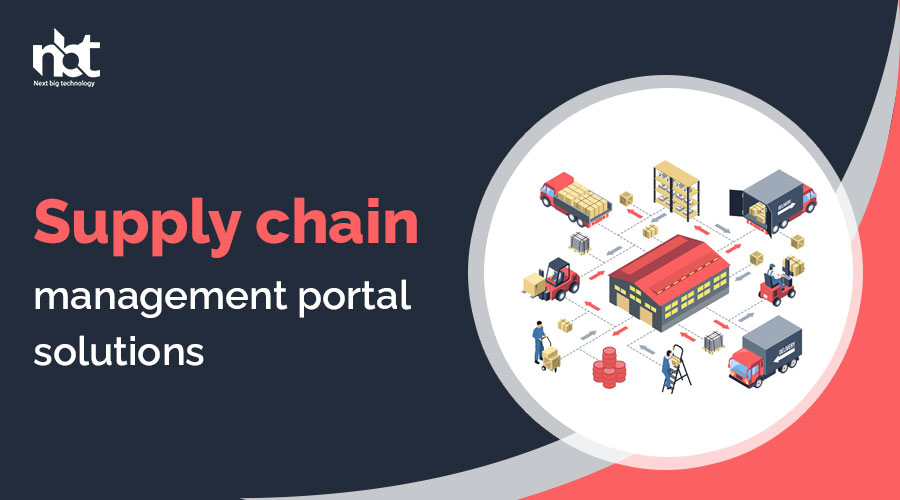Table of Contents
Supply chain management portal solutions Services
In today’s fast-paced business landscape, efficient supply chain management is crucial for companies to stay competitive. The advent of technology has revolutionized the way supply chains operate, paving the way for innovative solutions to streamline processes and enhance visibility. One such solution gaining traction in the industry is supply chain management portal services. In this comprehensive guide, we’ll delve into the intricacies of supply chain management portal solutions, exploring their benefits, key features, and how they can empower businesses to optimize their operations.
Understanding Supply Chain Management Portals
Supply chain management portals are digital platforms designed to facilitate the management of various aspects of the supply chain, from procurement and inventory management to logistics and distribution. These portals serve as centralized hubs that connect all stakeholders involved in the supply chain, including suppliers, manufacturers, distributors, and retailers. By providing real-time access to critical data and fostering collaboration among stakeholders, these portals enable organizations to make informed decisions, improve efficiency, and respond swiftly to market changes.
Key Features and Capabilities
Supply chain management portals offer a wide array of features and capabilities tailored to meet the diverse needs of businesses across industries. Some of the key features include:
- Supplier Management: Portal solutions streamline supplier onboarding, communication, and performance tracking, allowing businesses to effectively manage their supplier relationships and ensure compliance with contractual agreements.
- Inventory Visibility: Real-time visibility into inventory levels, stock movements, and demand forecasts empowers businesses to optimize inventory management, minimize stockouts, and reduce carrying costs.
- Order Tracking and Fulfillment: By providing end-to-end visibility into the order fulfillment process, portal solutions enable businesses to track orders, monitor delivery status, and address any issues promptly, enhancing customer satisfaction.
- Data Analytics: Advanced analytics tools embedded within supply chain management portals enable businesses to gain actionable insights from their supply chain data, identify trends, and optimize processes for greater efficiency and cost savings.
- Collaboration Tools: Built-in collaboration tools such as messaging, document sharing, and task management facilitate seamless communication and collaboration among supply chain partners, fostering transparency and alignment.
Benefits of Supply Chain Management Portals
Implementing a supply chain management portal can yield a multitude of benefits for businesses, including:
- Improved Efficiency: Automation of manual tasks, streamlined processes, and real-time data access help businesses operate more efficiently, reducing lead times and enhancing productivity.
- Enhanced Visibility: Greater visibility into supply chain activities and performance metrics enables businesses to identify bottlenecks, mitigate risks, and make informed decisions to drive continuous improvement.
- Cost Savings: By optimizing inventory levels, minimizing stockouts, and improving resource utilization, supply chain management portals help businesses reduce operational costs and achieve better overall financial performance.
- Greater Agility: The ability to adapt quickly to changing market conditions, customer demands, and supply chain disruptions is crucial in today’s dynamic business environment. Supply chain management portals empower businesses with the agility to respond swiftly and effectively to unforeseen challenges.
- Competitive Advantage: By streamlining processes, enhancing collaboration, and optimizing supply chain operations, businesses can gain a competitive edge in the market, delivering superior products and services to customers.
How to Create a Supply chain management portal solutions
In today’s dynamic business landscape, efficient supply chain management is vital for the success and sustainability of any enterprise. With the rapid advancements in technology, creating a supply chain management portal has become essential to streamline operations, enhance visibility, and drive profitability. This comprehensive guide will walk you through the process of developing a robust supply chain management portal solution.
Understanding the Need: Before diving into the development process, it’s crucial to understand the specific requirements and challenges faced by your organization. Conduct a thorough analysis of your existing supply chain processes, identify pain points, and define clear objectives for the portal solution. Whether it’s inventory management, order tracking, or supplier communication, outlining your goals will serve as a roadmap for the development process.
Selecting the Right Technology Stack: Choosing the appropriate technology stack is paramount to the success of your supply chain management portal. Consider factors such as scalability, security, and integration capabilities when selecting the tools and frameworks. Opt for reliable platforms like cloud-based solutions, which offer flexibility and scalability to accommodate your evolving business needs. Additionally, prioritize security features to safeguard sensitive data and ensure compliance with regulatory standards.
Designing User-Centric Interfaces: A user-friendly interface is essential for driving user adoption and maximizing the efficiency of your supply chain management portal. Collaborate with UX/UI designers to create intuitive interfaces that cater to the needs of different stakeholders, including suppliers, distributors, and internal teams. Implement features such as customizable dashboards, real-time notifications, and intuitive navigation to streamline workflows and enhance user experience.
Integrating Key Functionalities: The success of your supply chain management portal hinges on its ability to centralize and automate critical processes. Integrate functionalities such as inventory management, order processing, and logistics tracking to provide end-to-end visibility across the supply chain. Leverage APIs and middleware to seamlessly connect with existing systems and third-party applications, ensuring smooth data flow and interoperability.
Implementing Advanced Analytics: Harness the power of data analytics to derive actionable insights and optimize your supply chain operations. Incorporate advanced analytics tools to monitor key performance indicators (KPIs), identify trends, and forecast demand accurately. By leveraging predictive analytics and machine learning algorithms, you can anticipate potential disruptions, optimize inventory levels, and make data-driven decisions to drive efficiency and cost savings.
Ensuring Continuous Improvement: The development of a supply chain management portal is an iterative process that requires ongoing evaluation and refinement. Solicit feedback from users, monitor system performance, and conduct regular audits to identify areas for improvement. Embrace a culture of continuous improvement by implementing agile methodologies and leveraging user feedback to prioritize feature enhancements and updates.
Why Should You Go for Supply chain management portal solutions
In today’s rapidly evolving business landscape, the efficient management of the supply chain has become a cornerstone of success for companies across industries. With globalization, increasing customer demands, and growing competition, businesses are constantly seeking ways to optimize their supply chain processes. One solution that has emerged as a game-changer in this regard is Supply Chain Management (SCM) portal solutions.
What exactly are SCM portal solutions, and why should businesses consider integrating them into their operations? Let’s delve into the compelling reasons:
- Enhanced Visibility and Transparency: SCM portal solutions provide real-time visibility into every aspect of the supply chain, from procurement to delivery. With access to accurate data and analytics, businesses can make informed decisions, identify bottlenecks, and mitigate risks effectively. This transparency fosters trust among stakeholders and enables proactive problem-solving.
- Efficient Collaboration: Collaboration is key in supply chain management, especially in today’s interconnected world where suppliers, manufacturers, distributors, and customers are often geographically dispersed. SCM portal solutions facilitate seamless communication and collaboration among all parties involved, streamlining processes and minimizing delays. From placing orders to tracking shipments, stakeholders can interact efficiently within a centralized platform.
- Optimized Inventory Management: Effective inventory management is critical for minimizing costs and maximizing customer satisfaction. SCM portal solutions offer sophisticated inventory tracking capabilities, allowing businesses to maintain optimal inventory levels, reduce stockouts, and avoid overstock situations. By synchronizing inventory data across the supply chain, companies can achieve higher accuracy and responsiveness.
- Cost Savings: Implementing SCM portal solutions can lead to significant cost savings in various areas of operations. By optimizing inventory levels, minimizing transportation costs, and reducing manual errors, businesses can achieve greater efficiency and profitability. Moreover, streamlined processes result in faster order fulfillment and shorter lead times, enhancing customer satisfaction and retention.
- Adaptability and Scalability: In today’s dynamic business environment, flexibility and scalability are essential qualities for any supply chain solution. SCM portal solutions offer modular architectures that can be customized to meet the specific needs of different industries and businesses of all sizes. Whether you’re a small startup or a multinational corporation, these solutions can adapt to your evolving requirements and scale up as your business grows.
- Compliance and Risk Management: Compliance with regulatory requirements and mitigation of supply chain risks are paramount concerns for businesses operating in diverse markets. SCM portal solutions enable companies to ensure compliance with industry standards and regulations while proactively identifying and addressing potential risks. By centralizing data and implementing robust risk management protocols, businesses can safeguard their operations and reputation.
- Improved Customer Experience: Ultimately, all supply chain efforts should culminate in a superior customer experience. SCM portal solutions play a crucial role in this regard by enabling faster order processing, accurate tracking, and timely delivery. By meeting customer expectations consistently, businesses can foster loyalty, generate positive word-of-mouth, and gain a competitive edge in the market.
Market Prospects of Custom Supply chain management portal solutions and Platforms
In today’s rapidly evolving business landscape, efficient supply chain management has become paramount for companies striving to stay competitive. With the increasing complexity of global trade networks and consumer demands, businesses are turning towards custom supply chain management portal solutions and platforms to streamline their operations. These tailored solutions offer a plethora of benefits, ranging from enhanced visibility and control to improved collaboration and efficiency throughout the supply chain.
The market prospects for custom supply chain management portal solutions and platforms are undeniably promising, driven by several key factors.
- Demand for Streamlined Operations: As businesses aim to optimize their supply chain processes, there is a growing demand for tailored solutions that can seamlessly integrate with existing systems and provide comprehensive visibility into every aspect of the supply chain. Custom portals offer the flexibility to adapt to unique business requirements, allowing companies to streamline operations and reduce inefficiencies.
- Rising Complexity in Global Supply Chains: With the expansion of global trade networks, supply chains have become increasingly intricate, involving multiple stakeholders and disparate systems. Custom supply chain management portals provide a centralized platform for managing diverse processes, from procurement and inventory management to logistics and distribution, thereby addressing the complexities of modern supply chains.
- Focus on Data-Driven Decision Making: In today’s data-driven era, businesses rely on actionable insights to drive strategic decision-making. Custom portals leverage advanced analytics and reporting capabilities to provide real-time visibility into key performance metrics, enabling businesses to make informed decisions and proactively respond to changing market dynamics.
- Emphasis on Collaboration and Communication: Effective collaboration among supply chain partners is essential for ensuring seamless coordination and timely delivery of goods. Custom portals facilitate communication and collaboration by enabling secure data sharing, task assignment, and document management, fostering stronger relationships between suppliers, manufacturers, distributors, and customers.
- Integration of Emerging Technologies: The integration of emerging technologies such as Internet of Things (IoT), artificial intelligence (AI), and blockchain is reshaping the landscape of supply chain management. Custom portals leverage these technologies to automate processes, enhance visibility, and mitigate risks, thereby driving efficiency and innovation across the supply chain.
- Scalability and Adaptability: As businesses expand and evolve, scalability and adaptability become critical considerations. Custom supply chain management portals offer the scalability to accommodate growth and the flexibility to adapt to changing business needs, ensuring long-term viability and competitiveness in the market.
Essential Features of a Supply chain management portal solutions
In today’s fast-paced business environment, efficient supply chain management is paramount for organizations striving to stay competitive and meet customer demands. With the advent of technology, supply chain management portal solutions have emerged as indispensable tools for streamlining operations, enhancing visibility, and driving collaboration across the supply chain network. These portals offer a comprehensive platform for managing various aspects of the supply chain, from procurement to distribution. Let’s delve into the essential features that make up a robust supply chain management portal solution:
- Centralized Dashboard: A user-friendly dashboard serves as the nerve center of the supply chain portal, providing stakeholders with real-time insights into key performance indicators, such as inventory levels, order statuses, and delivery schedules. A centralized view empowers decision-makers to identify bottlenecks, optimize processes, and make informed decisions promptly.
- Inventory Management: Effective inventory management is critical for minimizing stockouts, reducing excess inventory, and optimizing carrying costs. A supply chain portal should offer robust inventory tracking capabilities, allowing users to monitor stock levels, track inventory movements, and set automated replenishment triggers to ensure seamless operations.
- Supplier Collaboration: Collaborating closely with suppliers is essential for maintaining a reliable supply chain. The portal should facilitate seamless communication and collaboration with suppliers, enabling electronic order placement, invoice management, and performance monitoring. Integration with supplier systems can streamline transactions and enhance visibility across the entire procurement process.
- Order Processing and Fulfillment: Efficient order processing and fulfillment are essential for meeting customer expectations and driving satisfaction. The portal should support automated order processing, from order capture to shipment, with features such as order routing, picking optimization, and shipment tracking. Integration with warehouse management systems ensures smooth order fulfillment operations.
- Transportation Management: Transportation plays a pivotal role in supply chain efficiency, impacting delivery times, costs, and customer satisfaction. A robust supply chain portal should include transportation management capabilities, allowing users to optimize routes, consolidate shipments, and track deliveries in real-time. Integration with carrier systems facilitates seamless communication and enhances visibility across the transportation network.
- Analytics and Reporting: Data-driven insights are invaluable for identifying trends, optimizing processes, and making informed decisions. The portal should offer robust analytics and reporting functionalities, allowing users to generate customized reports, visualize key metrics, and gain actionable insights into supply chain performance. Predictive analytics capabilities can help forecast demand, mitigate risks, and drive continuous improvement initiatives.
- Scalability and Flexibility: As businesses evolve and grow, scalability and flexibility become essential considerations. A supply chain portal should be scalable to accommodate growing transaction volumes and adaptable to evolving business requirements. Cloud-based deployment options offer scalability and flexibility, enabling access from anywhere, anytime, and on any device.
- Security and Compliance: With the increasing prevalence of cyber threats and data breaches, security is paramount for safeguarding sensitive supply chain information. The portal should employ robust security measures, such as encryption, access controls, and regular security audits, to protect data integrity and confidentiality. Compliance with industry regulations, such as GDPR and HIPAA, ensures adherence to data protection standards.
Advanced Features Supply chain management portal solutions
In today’s rapidly evolving business landscape, efficient supply chain management has become paramount for organizations striving to stay competitive. With the advent of advanced technology, supply chain management portal solutions have emerged as indispensable tools for streamlining operations, enhancing visibility, and optimizing processes across the entire supply chain ecosystem. These portals offer a plethora of advanced features that empower businesses to adapt to dynamic market demands, mitigate risks, and drive sustainable growth.
- Real-Time Tracking and Monitoring: Modern supply chain portals provide real-time visibility into the movement of goods and materials throughout the supply chain. Advanced tracking and monitoring functionalities enable stakeholders to monitor shipments, inventory levels, and production statuses in real-time. This level of transparency allows for proactive decision-making, minimizing delays, and improving overall operational efficiency.
- Predictive Analytics and Forecasting: Leveraging the power of data analytics, supply chain portals can generate actionable insights and predictive forecasts. By analyzing historical data, market trends, and external factors, these solutions help organizations anticipate demand fluctuations, optimize inventory levels, and mitigate potential disruptions. Predictive analytics enable businesses to make informed decisions, reduce excess inventory costs, and enhance customer satisfaction.
- Collaborative Planning and Execution: Collaboration is key to a resilient and agile supply chain. Advanced supply chain portals facilitate seamless collaboration among various stakeholders, including suppliers, manufacturers, distributors, and retailers. These portals offer features such as collaborative planning tools, shared dashboards, and communication channels, fostering alignment and coordination across the entire supply chain network. By breaking down silos and promoting collaboration, organizations can optimize processes, reduce lead times, and improve overall performance.
- Supply Chain Visibility Across Multiple Tiers: Supply chains today are increasingly complex, with multiple tiers of suppliers and subcontractors involved in the production process. Advanced supply chain portals provide end-to-end visibility across multiple tiers, allowing organizations to track and monitor activities at each stage of the supply chain. This heightened visibility enables better risk management, supplier performance evaluation, and compliance monitoring, ultimately enhancing supply chain resilience and sustainability.
- Integration with Emerging Technologies: To stay ahead of the curve, supply chain portals are integrating emerging technologies such as Internet of Things (IoT), artificial intelligence (AI), and blockchain. IoT sensors provide real-time data on the condition and location of goods in transit, AI algorithms optimize route planning and demand forecasting, while blockchain ensures transparency and immutability of supply chain transactions. By harnessing the power of these technologies, organizations can unlock new levels of efficiency, traceability, and trust across the supply chain.
- Customization and Scalability: One size does not fit all when it comes to supply chain management. Advanced portals offer customizable features and modular architectures that can be tailored to the specific needs and requirements of each organization. Whether it’s adapting to changing business processes, scaling operations to accommodate growth, or integrating with existing systems, these portals provide the flexibility and scalability needed to support evolving business needs.
Supply chain management portal solutions Timelines
In today’s fast-paced business environment, efficient supply chain management (SCM) is crucial for companies to stay competitive and meet customer demands. With the rise of globalization and technological advancements, the complexity of managing supply chains has increased significantly. However, with the advent of supply chain management portal solutions, businesses now have powerful tools at their disposal to streamline processes, enhance visibility, and optimize operations. In this article, we’ll delve into the world of SCM portals, exploring their benefits, implementation timelines, and best practices.
Understanding SCM Portals:
Supply chain management portals are comprehensive platforms that integrate various aspects of the supply chain, from procurement and production to distribution and logistics. These portals leverage advanced technologies such as cloud computing, big data analytics, artificial intelligence, and blockchain to provide real-time insights and facilitate collaboration among stakeholders.
Benefits of SCM Portals:
- Enhanced Visibility: SCM portals offer real-time visibility into inventory levels, order statuses, and shipment tracking, allowing businesses to make informed decisions and respond quickly to changes in demand or supply.
- Improved Collaboration: By centralizing communication and data sharing, SCM portals facilitate collaboration among suppliers, manufacturers, distributors, and retailers, leading to smoother operations and better coordination across the supply chain network.
- Cost Savings: Through automation, optimization, and better inventory management, SCM portals help reduce costs associated with excess inventory, stockouts, transportation, and warehousing.
- Risk Mitigation: With features like predictive analytics and risk assessment tools, SCM portals enable proactive risk management, helping businesses identify and mitigate potential disruptions such as supplier delays, natural disasters, or geopolitical events.
- Scalability and Flexibility: SCM portals are scalable and customizable, allowing businesses to adapt to changing market conditions, scale operations, and integrate new technologies or partners as needed.
Implementation Timelines:
Implementing an SCM portal involves several key steps, including:
- Assessment and Planning: Conduct a comprehensive assessment of current supply chain processes, identify pain points, and define objectives for the portal implementation.
- Vendor Selection: Research and evaluate SCM portal vendors based on factors such as features, scalability, integration capabilities, user interface, and customer support.
- Customization and Integration: Work closely with the selected vendor to customize the portal to meet specific business requirements and integrate it with existing ERP, CRM, and other systems.
- Pilot Testing: Conduct pilot testing with a select group of users to ensure that the portal meets performance expectations and addresses key functionalities.
- Training and Deployment: Provide training to employees and stakeholders on how to use the portal effectively, and roll out the solution gradually across the organization.
- Monitoring and Optimization: Continuously monitor the performance of the SCM portal, gather feedback from users, and implement optimizations and updates as needed to ensure maximum efficiency and ROI.
Best Practices for Successful Implementation:
- Executive Sponsorship: Ensure strong leadership support and involvement throughout the implementation process to drive alignment, allocate resources, and overcome organizational barriers.
- Change Management: Implement effective change management strategies to communicate the benefits of the SCM portal to employees, address resistance to change, and foster a culture of collaboration and innovation.
- Data Quality and Security: Prioritize data quality and security measures to ensure the integrity, confidentiality, and availability of sensitive supply chain information.
- Continuous Improvement: Foster a culture of continuous improvement by encouraging feedback, monitoring key performance indicators (KPIs), and leveraging analytics to identify opportunities for optimization and innovation.
How Much Does It Cost to Supply chain management portal solutions?
In today’s dynamic business landscape, effective supply chain management is crucial for organizations aiming to stay competitive and meet customer demands efficiently. One key tool that facilitates this process is a supply chain management portal. These portals streamline operations, enhance collaboration, and provide real-time insights into the supply chain ecosystem. However, before implementing such a solution, understanding the associated costs is essential.
- Initial Setup Costs: The cost of implementing a supply chain management portal can vary based on factors such as the complexity of the organization’s supply chain, the size of the company, and the features required. Initial setup costs typically include software licensing fees, customization expenses, and integration costs with existing systems like ERP (Enterprise Resource Planning) software.
- Software Licensing Fees: Supply chain management portal solutions often operate on a subscription-based model, where businesses pay a monthly or annual fee for using the software. The pricing structure may depend on the number of users, the scope of functionalities, and additional services offered by the provider. It’s essential to evaluate different pricing plans to choose the one that aligns with your organization’s needs and budget.
- Customization and Integration: Tailoring the portal to suit specific business requirements may involve additional costs. Customization ensures that the solution addresses unique challenges and aligns with existing workflows seamlessly. Integration with other enterprise systems, such as inventory management software or transportation management systems, is crucial for data consistency and process efficiency but may require investment in terms of time and resources.
- Maintenance and Support: Beyond the initial setup, ongoing maintenance and support are necessary to ensure the smooth functioning of the supply chain management portal. This includes software updates, troubleshooting, and technical support services. The cost of maintenance can vary based on the level of support required and the complexity of the solution.
- Training and Onboarding: Adequate training and onboarding of employees are essential for maximizing the benefits of a supply chain management portal. Investing in comprehensive training programs ensures that users can leverage the full potential of the software, leading to improved productivity and efficiency. While training expenses may add to the overall cost, they are crucial for long-term success.
- Scalability and Growth: As businesses evolve and grow, scalability becomes a critical factor in assessing the cost-effectiveness of supply chain management portal solutions. Organizations should consider solutions that can scale seamlessly to accommodate changing needs without significant additional expenses. Scalability ensures that the investment in the portal continues to deliver value as the business expands.
- Return on Investment (ROI): While the upfront costs of implementing a supply chain management portal may seem significant, it’s essential to evaluate the potential return on investment. These solutions can lead to cost savings through improved inventory management, reduced lead times, better supplier collaboration, and enhanced visibility across the supply chain. Calculating the ROI helps justify the expenditure and demonstrates the tangible benefits of the portal to stakeholders.
How to Create a Supply chain management portal solutions – Team and Tech Stack
In the fast-paced world of modern commerce, effective supply chain management is essential for businesses to thrive. With the increasing complexity of global trade and logistics, organizations are turning to supply chain management portals to streamline operations, enhance visibility, and improve collaboration among stakeholders. If you’re considering developing a supply chain management portal for your business, understanding the crucial elements of the team and the technology stack is paramount.
The Team:
- Project Manager: A seasoned project manager is vital for overseeing the development process, coordinating tasks, and ensuring that the project stays on track. They serve as the bridge between the development team and stakeholders, keeping everyone informed about progress, timelines, and requirements.
- Business Analyst: A business analyst plays a key role in understanding the business requirements and translating them into technical specifications. They work closely with stakeholders to gather requirements, analyze workflows, and identify areas for improvement within the supply chain.
- Developers: The development team comprises frontend and backend developers responsible for building the portal’s user interface and backend functionality, respectively. They should be proficient in technologies such as JavaScript, HTML/CSS, and frameworks like React or Angular for the frontend, and languages like Java, Python, or Node.js for the backend.
- Database Administrator: Managing data efficiently is crucial for a supply chain management portal. A database administrator is responsible for designing the database schema, optimizing queries for performance, and ensuring data integrity and security.
- UI/UX Designer: A UI/UX designer focuses on creating an intuitive and visually appealing user interface for the portal. They conduct user research, design wireframes and prototypes, and collaborate with developers to ensure a seamless user experience.
- Quality Assurance (QA) Team: The QA team is responsible for testing the portal to identify and fix any bugs or issues before deployment. They perform functional testing, usability testing, and regression testing to ensure that the portal meets quality standards.
The Tech Stack:
- Cloud Infrastructure: Leveraging cloud infrastructure such as Amazon Web Services (AWS) or Microsoft Azure provides scalability, flexibility, and reliability for your supply chain management portal. It allows you to easily scale resources based on demand and ensures high availability and data security.
- Frontend Technologies: For the frontend, modern frameworks like React.js or Angular.js offer powerful tools for building interactive and responsive user interfaces. These frameworks enable developers to create dynamic UI components and optimize performance for a seamless user experience.
- Backend Technologies: When it comes to the backend, technologies like Node.js, Python (with Django or Flask), or Java (with Spring Boot) are commonly used for building scalable and robust server-side applications. These technologies provide features such as asynchronous processing, RESTful APIs, and ORM for database interaction.
- Database Management System (DBMS): Choosing the right DBMS is crucial for storing and managing data effectively. Options like PostgreSQL, MySQL, or MongoDB offer reliability, scalability, and support for complex queries, making them suitable choices for a supply chain management portal.
- API Integration: Integration with third-party APIs allows the portal to connect with external systems such as ERP (Enterprise Resource Planning) software, logistics providers, and payment gateways. Technologies like RESTful APIs and GraphQL facilitate seamless communication and data exchange between different systems.
- Security Measures: Implementing robust security measures is paramount to protect sensitive supply chain data from unauthorized access and cyber threats. This includes measures such as encryption, authentication, authorization, and regular security audits to ensure compliance with industry standards and regulations.
Supply chain management portal solutions Process
In the fast-paced world of modern business, efficient supply chain management has become imperative for success. Companies are constantly seeking innovative solutions to streamline their processes, reduce costs, and enhance transparency across the supply chain. This is where supply chain management portal solutions come into play, offering a comprehensive platform to manage and optimize various aspects of the supply chain process.
Supply chain management portal solutions encompass a range of tools and technologies designed to facilitate the seamless flow of goods, information, and finances from the point of origin to the point of consumption. These portals provide businesses with real-time visibility into their supply chain, allowing them to monitor inventory levels, track shipments, and analyze performance metrics.
One of the key benefits of supply chain management portal solutions is their ability to centralize data and communication channels. By bringing together suppliers, manufacturers, distributors, and retailers onto a single platform, these portals enable smoother collaboration and coordination across the entire supply chain network. This centralized approach helps to eliminate silos, reduce errors, and improve decision-making processes.
Moreover, supply chain management portals are equipped with advanced analytics capabilities that allow companies to gain valuable insights into their operations. By leveraging data analytics, businesses can identify inefficiencies, forecast demand, and optimize inventory levels to meet customer demand more effectively. This data-driven approach not only improves operational efficiency but also enables companies to make more informed strategic decisions.
Another significant advantage of supply chain management portal solutions is their ability to enhance transparency and traceability. With increasing consumer demand for sustainability and ethical sourcing, companies are under pressure to ensure greater visibility into their supply chain practices. Supply chain management portals enable companies to trace the journey of products from the source to the end consumer, providing assurance regarding factors such as quality, authenticity, and compliance with regulatory standards.
Furthermore, supply chain management portals play a crucial role in risk management and mitigation. By identifying potential bottlenecks, disruptions, and vulnerabilities in the supply chain, companies can proactively implement contingency plans to minimize the impact of unforeseen events such as natural disasters, geopolitical tensions, or pandemics. This proactive approach helps to build resilience and agility within the supply chain, enabling businesses to adapt swiftly to changing market conditions.
Next Big Technology – Your Trusted Supply chain management portal solutions Partner
In the dynamic landscape of modern business, effective supply chain management stands as the backbone of success. As industries continue to evolve and global markets become increasingly interconnected, the need for robust, efficient, and reliable supply chain solutions has never been greater. Enter the next big technology in this arena – your trusted supply chain management portal solutions partner.
In today’s fast-paced world, businesses are constantly seeking ways to streamline operations, optimize processes, and enhance collaboration across the supply chain. This is where innovative portal solutions come into play, offering a comprehensive platform to connect suppliers, manufacturers, distributors, and retailers seamlessly.
So, what exactly sets apart a trusted supply chain management portal solutions partner? Let’s delve into the key aspects:
- Cutting-Edge Technology: Embracing the latest technological advancements is paramount in navigating the complexities of modern supply chains. A trusted partner will leverage cutting-edge technologies such as artificial intelligence, machine learning, blockchain, and IoT to deliver innovative portal solutions tailored to your specific needs.
- End-to-End Visibility: One of the biggest challenges in supply chain management is achieving end-to-end visibility. A reliable portal solution offers real-time insights into inventory levels, shipment statuses, production schedules, and more. This transparency enables proactive decision-making and mitigates the risks associated with disruptions.
- Scalability and Flexibility: As your business grows and evolves, so do your supply chain requirements. A trusted partner understands the importance of scalability and flexibility, offering customizable portal solutions that can adapt to changing demands and accommodate future expansion seamlessly.
- Security and Compliance: With cyber threats on the rise, ensuring the security of sensitive supply chain data is non-negotiable. A reputable partner prioritizes data security and compliance, implementing robust measures such as encryption, access controls, and regular audits to safeguard your information and maintain regulatory compliance.
- Collaboration and Communication: Effective collaboration and communication are essential for optimizing supply chain performance. A trusted portal solutions partner provides a centralized platform where stakeholders can collaborate in real-time, share information, and streamline communication across the entire supply chain ecosystem.
- Continuous Support and Innovation: The journey towards supply chain excellence is ongoing, requiring continuous support and innovation. A reliable partner is committed to your success, providing dedicated support services and staying ahead of the curve with ongoing enhancements and updates to the portal solutions.
Enterprise Supply chain management portal solutions
In the dynamic landscape of modern business, efficiency and agility are paramount. Enterprises are constantly seeking innovative solutions to optimize their operations, and one area where significant gains can be made is in supply chain management. The advent of enterprise supply chain management portal solutions has revolutionized the way businesses orchestrate their supply chain activities, offering a centralized platform for seamless coordination and collaboration across the entire value chain.
At its core, an enterprise supply chain management portal serves as a digital nerve center, bringing together disparate elements of the supply chain – from procurement and production to distribution and logistics – into a unified ecosystem. This convergence enables real-time visibility into all aspects of the supply chain, empowering stakeholders with actionable insights to make informed decisions swiftly.
One of the key advantages of adopting a supply chain management portal is enhanced transparency. By providing stakeholders with a holistic view of the supply chain, organizations can identify bottlenecks, anticipate disruptions, and proactively mitigate risks. This transparency fosters greater accountability and trust among partners, leading to stronger relationships and more efficient collaboration.
Furthermore, supply chain management portals enable process automation, eliminating manual tasks and streamlining workflows. Through integration with advanced technologies such as artificial intelligence and machine learning, these portals can analyze vast amounts of data to optimize inventory levels, forecast demand, and optimize routes for transportation, ultimately driving down costs and improving overall efficiency.
Another critical aspect of supply chain management portals is their role in fostering collaboration among stakeholders. By connecting suppliers, manufacturers, distributors, and customers on a single platform, these portals facilitate seamless communication and information sharing. Whether it’s sharing production schedules, coordinating shipments, or resolving issues in real-time, collaborative features empower stakeholders to work together towards common goals, driving greater agility and responsiveness.
From a strategic standpoint, supply chain management portals provide invaluable insights that enable organizations to adapt to changing market dynamics and capitalize on emerging opportunities. By leveraging analytics and predictive modeling, businesses can identify trends, anticipate customer demand, and optimize their supply chain strategies accordingly, gaining a competitive edge in the market.
Top Supply chain management portal solutions Companies
In today’s fast-paced business landscape, effective supply chain management is essential for maintaining competitiveness and meeting customer demands. Supply chain management portal solutions have emerged as invaluable tools for businesses to optimize their logistics operations, enhance visibility, and improve collaboration with suppliers and partners. Here, we explore some of the top companies offering cutting-edge supply chain management portal solutions.
-
-
Next Big Technology:
Next Big Technology is one of the top development companies for the high-quality development of mobile apps and web development services. They have having experienced in-house team of developers who provide top-notch development services according to the business requirements. NBT provides highly business-oriented services and implements all the latest and trending tools and technologies. They always work hard to deliver a top-notch solution at an affordable cost. They are having experience of more than 13 years and delivered lots of projects around the globe to businesses and clients.
NBT is highly focused on providing top-notch development solutions at a very affordable cost. By using their market experience and development experience, they are delivering proper solutions to clients and various industries for their custom requirements.
Location: India, USA, UK, Australia
Hourly Rate :< $25 per Hour
Employees: 50 – 249
Focus Area
- Mobile App Development
- App Designing (UI/UX)
- Software Development
- Web Development
- AR & VR Development
- Big Data & BI
- Cloud Computing Services
- DevOps
- E-commerce Development
Industries Focus
- Art, Entertainment & Music
- Business Services
- Consumer Products
- Designing
- Education
- Financial & Payments
- Gaming
- Government
- Healthcare & Medical
- Hospitality
- Information Technology
- Legal & Compliance
- Manufacturing
- Media
-
- Oracle SCM Cloud: Oracle SCM Cloud offers a robust suite of supply chain management portal solutions designed to streamline operations and drive innovation. Their platform integrates various modules including inventory management, order fulfillment, and transportation management, providing end-to-end visibility and control over supply chain processes. With advanced capabilities in predictive analytics and machine learning, Oracle SCM Cloud empowers businesses to make data-driven decisions and adapt to changing market dynamics.
- IBM Sterling Supply Chain Suite: IBM Sterling Supply Chain Suite delivers scalable and secure supply chain management portal solutions tailored to the needs of modern enterprises. Leveraging advanced technologies such as blockchain and AI, IBM Sterling enables real-time collaboration among trading partners, optimizing inventory levels and minimizing disruptions. With a focus on enhancing agility and responsiveness, IBM Sterling helps businesses achieve greater resilience in their supply chain operations.
- Coupa Supply Chain Design and Planning: Coupa’s Supply Chain Design and Planning solution offers a holistic approach to supply chain management, integrating planning, execution, and optimization capabilities into a single platform. Through advanced simulation and scenario analysis, Coupa enables businesses to design resilient supply chains that can adapt to various market conditions and disruptions. With features like demand forecasting and inventory optimization, Coupa empowers businesses to drive efficiency and reduce costs across their supply networks.
- JDA Software (now Blue Yonder): JDA Software, now part of Blue Yonder, provides innovative supply chain management portal solutions powered by AI and machine learning. Their platform offers end-to-end visibility and control over supply chain processes, enabling businesses to optimize inventory levels, improve demand forecasting, and enhance customer service. With a focus on driving continuous innovation, JDA Software helps businesses stay ahead of the curve in today’s dynamic marketplace.
FAQs on Supply chain management portal solutions
In the dynamic landscape of modern business, efficient supply chain management (SCM) is paramount for success. With the advent of technology, supply chain management portal solutions have become integral tools for streamlining operations, enhancing visibility, and ensuring seamless collaboration across the supply chain ecosystem. However, for those new to this concept, navigating through the intricacies of SCM portals can be daunting. To shed light on this crucial aspect of business operations, let’s delve into some frequently asked questions (FAQs) surrounding supply chain management portal solutions:
- What exactly is a supply chain management portal?
- A supply chain management portal is a digital platform that facilitates the management and optimization of various processes within the supply chain. It serves as a centralized hub where stakeholders can access real-time data, collaborate, track shipments, manage inventory, and streamline communication.
- What are the key features of SCM portal solutions?
- SCM portal solutions typically offer a range of features including inventory management, order tracking, supplier management, demand forecasting, analytics and reporting, integration capabilities with other business systems, and often incorporate features such as AI and machine learning for enhanced decision-making.
- How can an SCM portal benefit my business?
- Implementing an SCM portal can yield numerous benefits such as improved visibility across the supply chain, reduced lead times, enhanced inventory management leading to lower carrying costs, increased efficiency through automation of manual processes, better collaboration with suppliers and partners, and ultimately, higher customer satisfaction.
- Are SCM portal solutions scalable for businesses of all sizes?
- Yes, SCM portal solutions come in various sizes and configurations to suit the needs of businesses ranging from small startups to large enterprises. Many providers offer scalable solutions that can grow with your business, allowing you to add or customize features as needed.
- How do SCM portals integrate with existing business systems?
- Integration is a key aspect of SCM portal solutions. They can be seamlessly integrated with existing enterprise resource planning (ERP) systems, warehouse management systems (WMS), customer relationship management (CRM) software, transportation management systems (TMS), and other relevant platforms to ensure smooth data flow and process synchronization.
- What security measures are in place to protect sensitive supply chain data?
- Security is a top priority for SCM portal providers. They employ robust encryption protocols, access controls, user authentication mechanisms, and data backup procedures to safeguard sensitive information from unauthorized access, cyber threats, and data breaches.
- How long does it take to implement an SCM portal solution?
- The implementation timeline can vary depending on factors such as the complexity of your supply chain, customization requirements, integration with existing systems, and the chosen vendor’s implementation process. Typically, implementation can take anywhere from a few weeks to several months.
- What ongoing support and maintenance services are provided?
- Most SCM portal providers offer ongoing support services to ensure smooth operation post-implementation. This may include technical support, software updates, training for users, and consulting services to optimize the use of the portal and address any evolving business needs.
- Can SCM portal solutions help mitigate supply chain disruptions?
- Yes, SCM portal solutions can play a crucial role in mitigating supply chain disruptions by providing real-time visibility into inventory levels, demand fluctuations, production delays, transportation issues, and other factors that may impact the supply chain. This enables proactive decision-making and risk management strategies.
- What is the ROI of implementing an SCM portal solution?
- The return on investment (ROI) of an SCM portal solution can be significant, including cost savings from improved efficiency, reduced inventory carrying costs, minimized stockouts, increased revenue through better customer satisfaction, and strategic advantages gained from enhanced supply chain visibility and agility.
Thanks for reading our post “Supply chain management portal solutions”. Please connect with us to learn more about the Supply chain management portal.
























